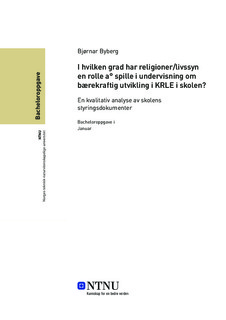| dc.contributor.advisor | Andreassen, Øyvind M. | |
| dc.contributor.author | Byberg, Bjørnar | |
| dc.date.accessioned | 2019-08-23T14:08:27Z | |
| dc.date.available | 2019-08-23T14:08:27Z | |
| dc.date.issued | 2019 | |
| dc.identifier.uri | http://hdl.handle.net/11250/2610364 | |
| dc.description.abstract | Denne bacheloroppgaven er en kvalitativ dokumentanalyse av formålsparagrafen i opplæringsloven, ny overordnet del av læreplanverket og siste høringsutkast for kommende læreplan i skolen. Analysen forsøker å undersøke i hvilken grad religion/livssyn har en rolle å spille i undervisning om bærekraftig utvikling i grunnopplæringen. Analysen er utført ved hjelp av en induktiv tilnærmingsmåte hvor forskningskategoriene som oppstod belyser sammenhengen mellom religion/livssyn og bærekraftig utvikling på ulike måter. Oppgaven antyder at det er en sterk implisitt sammenheng mellom religion/livssyn og bærekraftig utvikling flere steder, og at det som veier sterkest er formuleringen i læreplanen om at verdispørsmål i KRLE behandles på bakgrunn av religion/livssyn. Dette impliserer at bærekraftig utvikling også skal behandles på bakgrunn av religion/livssyn. Utfordringer med i hvilken grad dette kan skje i praksis er belyst i drøftingsdelen hvor relevansen for bærekraftig utvikling i undervisning i religion/livssyn er sett i lys av de ulike teoretiske perspektivene lære av religion, lived religion og innenfra-/utenfraperspektiv. Det blir belyst at en undervisning som vektlegger et utenfraperspektiv vil ha vanskelig med å vektlegge temaet i undervisning om religion/livssyn, men hvis de andre perspektivene som er nevnt blir prioritert kan de spille en rolle. Ny læreplan og andre aktuelle styringsdokumenter gir åpning for disse perspektivene i undervisning, hvilket forsterker at religion/livssyn kan ha en rolle å spille i undervisning om bærekraftig utvikling. | |
| dc.description.abstract | This bachelor thesis is a qualitative document analysis of the objectives of education and training from the Norwegian Education Act, the core curriculum – values and principles for primary and secondary education and training, and the exposure draft of the new Norwegian curriculum from 2020. The analysis in this thesis examines the extent to which religion/philosophies of life have a role to play in education on sustainable development in school. An inductive approach is used here, and the categories which came to light sheds light on the relationship between religion/philosophies of life and sustainable development in different ways. This thesis suggests that there is a strong correlation between them, and that the strongest correlation is where the curriculum says that education about values in the norwegion RE education is treated on the basis of religion/philosophies of life, which implicate that sustainable development should be treated on the basis of religion/philosophies of life. Challenges in the extent to which this can be realized in school is further on discussed in light of the theoretical perspectives of learning from religion, lived religion and an inside/outside perspective. We see that an education which favours an outside perspective will have difficulties in emphasizing the theme in education of religion/philosophies of life, but if the other mentioned perspectives get space in the education, sustainable development can play a role in education about religion/philosophies of life. The new curriculum and the other documents analyzed gives a space for those perspectives in the RE education, which strengthens the claim that religion/philosphies has a role to play in education about sustainable development in the norwegian school. | |
| dc.language | nob | |
| dc.publisher | NTNU | |
| dc.title | I hvilken grad har religioner/livssyn en rolle å spille i undervisning om bærekraftig utvikling i KRLE i skolen? En kvalitativ analyse av skolens styringsdokumenter | |
| dc.type | Bachelor thesis | |
